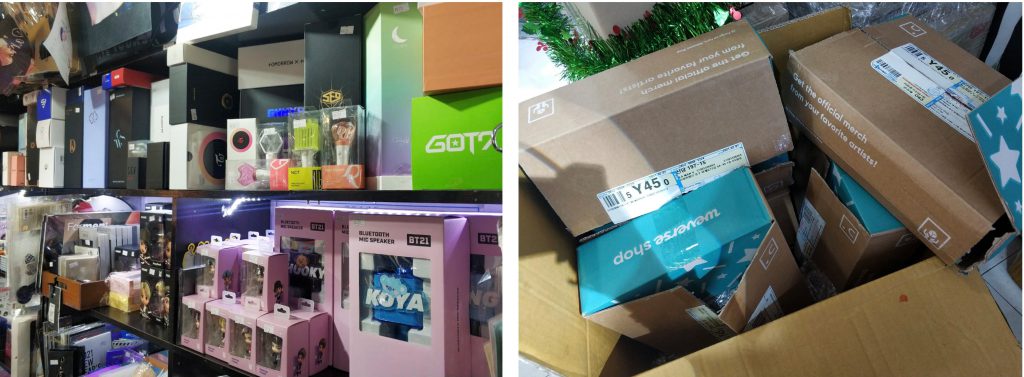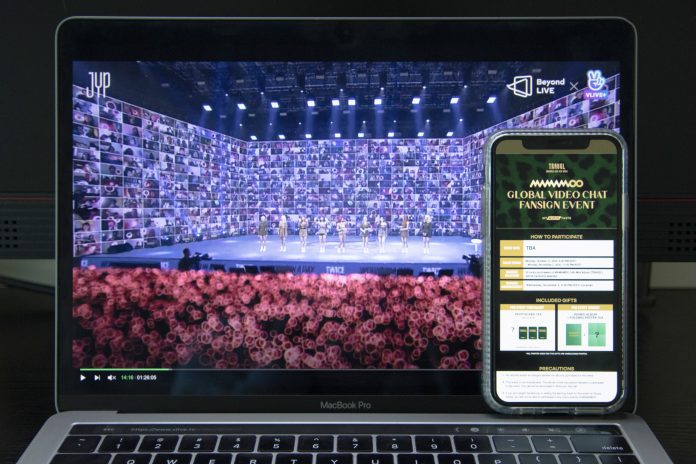While COVID-19 put brakes on travel, cross-border sales and concerts, in Hong Kong, fans and business operators do not see the local K-pop craze stemmed.
By Lesley Lam
Ikea Lam Tsz-kwan used to fly to different places to see her idols once every three to four months. Now, she cannot do so due to government restrictions around the world and flights cancellation during the COVID-19 pandemic.
Lam is a fansite owner who posts photos of Korean pop idols she has taken at events and concerts since January 2019. She has nearly 6,000 followers on Twitter.
“I feel really bored now. I miss those days when I could follow my idols to different places. It was fulfilling. I feel like I have nothing to do and have to stay at home every day now,” Lam says.
Knowing that fans like Lam are eager to see their idols but cannot see them in person, K-pop entertainment companies have organised online concerts and events to soothe their urge and engage fans in other countries since the start of 2020.
Instead of taking photos herself, Lam now shares retouched screen captures of online events and concerts on her fansite account.

“I feel really bored now. I miss those days when I could follow my idols to different places. It was fulfilling. I feel like I have nothing to do and have to stay at home every day now”
Adapting with Passion
Another K-pop fan Hong Tsz-tung is also adapting to the new online mode.
Hong went to Kwun Tong Promenade with her friends to watch an online concert together in May 2020.
“A huge part of the grass lawn there was closed to the public to prevent social gatherings, but we still managed to find a spot to sit down and watch the concert,” she recalls.
The 20-year-old girl says that in Hong Kong, K-pop fans usually meet up to buy and sell fan-made goods, such as trading cards and dolls at a flyover on the second floor of Langham Place.

She adds that before the pandemic, security guards only asked fans to scatter if they were blocking pedestrians’ way. Now, the guards ask fans to disperse whenever they are gathering due to social distancing policies.
“Fans are not really affected by this though, I once saw a photo on Instagram in which BTS (a k-pop boy group) fans clustered together at the flyover to get fan-made supporting items,” Hong says.
Manageable Difficulties
Due to the stark increase in coronavirus infections in July 2020, Hong stopped going to the shopping mall in Mongkok. She chose to mail self-made items to other fans instead but was faced with problems.
“There were incidents of mailing goods to the wrong people and missing mails,” Hong says.
The problem of logistics is shared by K-pop merchandise shop owner Kary Wong Ka-man and her husband.
The couple buys goods of different idol groups such as albums, lightsticks and keyrings, from official websites of those idol groups and K-pop stores in Korea. They cannot predict what merchandises will arrive and when they will arrive even after placing the order.
They can only wait for shipping warehouses in South Korea to mail the merchandises. And the warehouses only do so when the goods reach a certain weight.
Reliance on Korean purchasing agents and suppliers also causes logistics problem. “Since we are not in Korea ourselves (to check the quantity of the goods), sometimes goods that are supposed to be shipped aren’t shipped,” Wong says.
She adds that agents sometimes fail to buy timely merchandises. “For example, Seventeen (a K-pop boy group) has debuted for years and the agents once bought us goods consisting of the group’s debut photos.”

Revenue of the couple’s business dropped by around 50 per cent in the first half of 2020.
“Our shop is located in a shopping mall which was sometimes closed, and the shopper flow was low. Also, we were not familiar with the new changes caused by the pandemic at first,” she says.
Wong thinks the people have become more used to changes brought by the pandemic since the second half of 2020. They have become more willing to go out and consume.
“Our revenue now is more or less the same as it was before,” she says.
The Industry Strives to Survive
Event organizing companies in Hong Kong that work with Korean entertainment companies are still badly affected by the pandemic.
Nicole Leung Nga-wai, an event organiser with ten years of experience, says companies relying heavily on hosting K-pop shows are hit hard by the pandemic.
“For example the companies I used to work for mainly work on projects involving Korean artists and more than 80 per cent of the shows hosted are for K-pop stars. They rarely host shows for Chinese-speaking artists, only once or twice a year,” Leung says.
Leung says these companies are surviving by helping brand products companies to find K-pop stars as spokespersons, operating e-commerce of Korean goods, or promoting K-pop artists in Hong Kong depending on their specialties.
She adds that only a few Hong Kong organisers will buy exclusive rights of screening online concerts from Korean entertainment companies. In Hong Kong, it is also rare to have exclusive online video chat fan-sign events, in which usually 50 fans interact with their idols one-on-one directly.
“When we have online events now, organisers lose the edge of having Chinese fans joining events hosted by Hong Kong organisers. They will join the Mainland ones instead,” she explains.
Chinese fans account for a huge part of the audiences in Hong Kong K-pop events. “The ratio of Mainland Chinese audience in Hong Kong K-pop concerts can be up to 50 per cent or even more for some Korean artists’ shows,” Leung says.
Leung notes that the Korean Restriction Order in China was the reason why Chinese fans came to Hong Kong to meet their idols before the pandemic.
The order was China’s response to Korea’s deployment of the Terminal High Altitude Area Defense in 2016. Many Korean entertainment events have been banned in the Mainland since then.
“2017 was the year in which a record number of K-pop concerts were held in Hong Kong because these shows could not be hosted in China. Investors in China decided to host shows in Hong Kong instead,” Leung says.
Leung points out that the trend of hosting shows in Hong Kong continued until the Anti-Extradition Bill Law Movement in 2019 and dropped to zero after the pandemic broke out.
The Future of K-pop in Hong Kong
Steve Chung Lok-wai, assistant lecturer of the global studies programme at the Chinese University of Hong Kong, says Hong Kong is no longer the most favoured market in the eyes of Korean entertainment companies.
“Korean entertainment companies are shifting their focus to Southeast Asian markets like Vietnam, Indonesia, Thailand, as well as European countries and the U.S.,” he says.
“Korean entertainment companies are shifting their focus to Southeast Asian markets like Vietnam, Indonesia, Thailand, as well as European countries and the U.S.”
Chung believes the reason behind such change is that the Hong Kong market is small and already stable, so companies choose to direct promotional efforts to other markets instead.
“But since fans here have high purchasing power, it is most likely that Korean entertainment companies would still arrange events and concerts in Hong Kong,” Chung says.
Leung, who is also a fan of ‘Hallyu’, or the wave of Korean pop culture, believes Koreans still value the Hong Kong market. She thinks they have a special emotional affiliation to Hong Kong, probably stemmed from the city’s golden age of entertainment.
“The popularity of K-pop in Hong Kong is greatly related to its popularity worldwide. If it still thrives globally, I don’t think the Hong Kong market will respond differently,” the fan-turned event organiser says.
Edited by Kassandra Lai
Sub-edited by Sarah Ryou







































